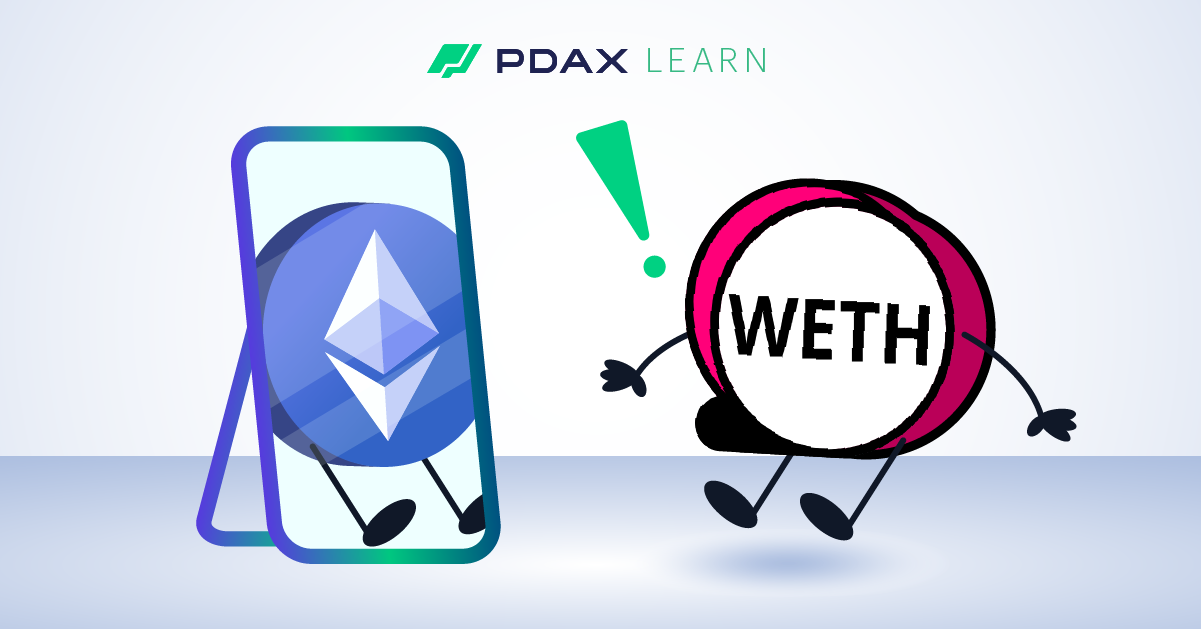Wrapped Ethereum (WETH) is a “wrapped” token, which functions as a “representative” for a cryptocurrency outside of its native blockchain. As some blockchains may have a limited number of decentralized apps (dApps)–or perhaps none at all–wrapped tokens allow users to carry the value of the token they represent to other networks to expand their utility. In this case, WETH is the wrapped version of Ethereum (ETH).
But though the Ethereum network itself already has plenty of dApps built on it, WETH also has the added benefit of being able to take advantage of other networks’ features such as faster transaction speeds and lower gas fees, since Ethereum has a history of issues with scalability and is still in the middle of a series of updates to fix their congestion issues.
How does WETH work?
WETH is able to track the value of Ethereum as it is backed by an equivalent amount of ETH held in smart contracts. This ensures that one WETH token will always be interchangeable for one ETH.
For convenience, WETH can be purchased directly from exchanges which list it, with the purchase holding the same value of ETH as if you had bought ETH all along. Alternatively, you can also “wrap” your ETH directly into WETH through swapping it through decentralized exchanges (DEX).
Once wrapped, WETH users can then utilize the value of ETH in other networks where WETH is supported such as on Polygon or Avalanche.
Note: WETH is only available on PDAX for the Polygon blockchain, Make sure that you are using the correct network as sending tokens to an unsupported network may result in the permanent loss of your funds.
Why use WETH?
WETH may have the same value as ETH, but it has a number of advantages over the latter:
WETH can be used seamlessly with dApps - WETH is interoperable with smart contracts, dApps, decentralized finance (deFi) instruments, and decentralized autonomous organizations (DAO) that are not compatible with the ERC-20 token standard of Ethereum.
Some dApps will automatically convert your ETH to WETH or prompt you to do so when you try using ETH on the platform. Bidding for non-fungible tokens (NFTs) on OpenSea for example, will require that you to “wrap” your ETH into WETH first.
WETH is more economical - WETH is more economical on gas fees than ETH especially when you use dApps frequently. Buying WETH directly from the start also means saving on the smart contract fees needed to wrap and unwrap your ETH.
How did WETH start?
Curiously though, WETH was also originally developed to represent ETH for dApps on the Ethereum network itself.
This might sound confusing. Why do we need to use a proxy token for ETH on its own native blockchain?
The reason is that ETH itself is not an ERC-20 token even though it is the primary token on Ethereum. This is because ETH was developed even before the ERC-20 token standard was introduced.
ERC-20 is basically the set of “rules” that tokens have to follow to be able to connect with Ethereum’s Layer-1 network. Hence, all the dApps built on top of Ethereum have to have ERC-20 tokens. Tokens like Basic Attention Token (BAT), Compound (COMP) and Aave (AAVE) are all ERC-20 tokens.
Thus, WETH is a token that greatly expands user options not just in the Ethereum network but in other alternative networks as well for accessing faster transaction speeds and even lower fees.
Tokenomics
Data on the overall supply of WETH in all supported networks is unavailable. On the Polygon blockchain however, WETH’s total supply is listed at approximately 268,000 tokens, for a market capitalization of $325 million as of November 2022.
Ready to start with crypto?
Start your trading journey with PDAX.
DISCLAIMER: The statements in this article do not constitute financial advice. PDAX does not guarantee the technical and financial integrity of the digital asset and its ecosystem. Any and all trading involving the digital asset is subject to the user’s risk and discretion and must be done after adequate and in-depth research and analysis.
About PDAX
PDAX is a BSP-licensed exchange where you can trade Bitcoin, Ethereum, and other cryptocurrencies directly using PHP!
You might also like
SUI is now on PDAX!
PDAX
January 28, 2026
PDAXScope: BTC rebounds, ETH boost, PYUSD surges
PDAX
December 12, 2025
PDAXScope: ETH rises with Fusaka live, BTC climbs above $93K
PDAX
December 05, 2025
MON (Monad) is now on PDAX!
PDAX
December 04, 2025
